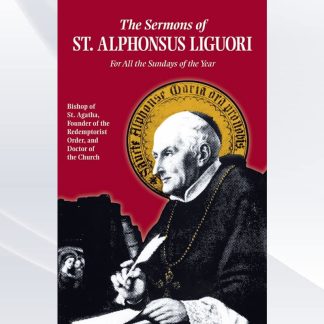

” Now when John had heard in prison the works of Christ” Matthew 11:2
In tribulations God enriches his beloved souls with the greatest graces. Behold, St. John in his chains comes to the knowledge of the works of Jesus Christ: ” When John had heard in prison the works of Christ.” Great indeed are the advantages of tribulations. The Lord sends them to us, not because he wishes our misfortune, but because he desires our welfare.
Hence, when they come upon us we must embrace them with thanksgiving, and must not only resign ourselves to the divine will, but must also rejoice that God treats us as he treated his Son Jesus Christ, whose life, upon this earth was always full of tribulation. I shall now show, in the first point, the advantages we derive from tribulations; and in the second, I shall point out the manner in which we ought to bear them.
First Point – On the great advantages we derive from tribulations.
1. “What doth he know that had not been tried? A man that hath much experience shall think of many things, and he that hath learned many things shall show forth understanding.” (Eccl. xxxiv. 9.) They who live in prosperity, and have no experience of adversity, know nothing of the state of their souls. In the first place, tribulation opens the eyes which prosperity had kept shut. St. Paul remained blind after Jesus Christ appeared to him, and, during his blindness, he perceived the errors in which he lived. During his imprisonment in Babylon, King Manasses had recourse to God, was convinced of the malice of his sins, and did penance for them. “And after that he was in distress he prayed to the Lord his God, and did penance exceedingly before the God of his fathers.” (2 Paral. xxxiii. 12.) The prodigal, when he found himself under the necessity of feeding swine, and afflicted with hunger, exclaimed: ”I will arise and go to my father.” (Luke xv. 18.)
2. Secondly, tribulation takes from our hearts all affections to earthly things. When a mother wishes to wean her infant she puts gall on the paps, to excite his disgust, and induce him to take better food. God treats us in a similar manner: to detach us from temporal goods, he mingles them with gall, that by tasting its bitterness, we may conceive a dislike for them, and place our affections on the things of Heaven. ”God,” says St. Augustine, ”mingles bitterness with earthly pleasures, that we may seek another felicity, whose sweetness does not deceive.” (Ser. xxix., de Verb. Dom.)
3. Thirdly, they who live in prosperity are molested by many temptations of pride, of vainglory; of desires of acquiring greater wealth, great honours, and greater pleasures. Tribulations free us from these temptations, and make us humble and content in the state in which the Lord has placed us. Hence the Apostle says: ”We are chastised by the Lord that we may not be condemned with this world.” (1 Cor. xi. 32.)
4. Fourthly, by tribulation we atone for the sins we have committed much better than by voluntary works of penance. “Be assured,” says St. Augustine, “that God is a physician, and that tribulation is a salutary medicine.” Oh! how great is the efficacy of tribulation in healing the wounds caused by our sins! Hence, the same saint rebukes the sinner who complains of God for sending him tribulations. ”Why,” he says, ”do you complain? What you suffer is a remedy, not a punishment.” (In Ps. lv.) Job called those happy men whom God corrects by tribulation; because he heals them with the very hands with which he strikes and wounds them. “Blessed is the man whom God correcteth. . . . For he woundeth and cureth. He striketh, and his hand shall heal.” (Job v. 17, 18.) Hence, St. Paul gloried in his tribulations: ”Gloriamur in tribulationibus.” (Rom. v. 3.)
5. Fifthly, by convincing us that God alone is able and willing to relieve us in our miseries, tribulations remind us of him, and compel us to have recourse to his mercy. ”In their affliction they will rise early to me.” (Osee vi. 1.) Hence, addressing the afflicted, the Lord said: ”Come to me, all you that labour and are burdened, and I will refresh you.” (Matt. xi. 28.) Hence he is called”a helper in troubles.” (Ps. xlv. 1 .) “When,” says David,” he slew them, then they sought him, and they returned.” (Ps. lxxvii. 34.) When the Jews were afflicted, and were slain by their enemies, they remembered the Lord, and returned to him.
6. Sixthly, tribulations enable us to acquire great merits before God, by giving us opportunities of exercising the virtues of humility, of patience, and of resignation to the divine will. The venerable John d’Avila used to say, that a single blessed be God: in adversity, is worth more than a thousand acts in prosperity. ”Take away,” says St. Ambrose, ”the contests of the martyrs, and you have taken away their crowns.” (In Luc., c. iv.) Oh! what a treasure of merit is acquired by patiently bearing insults, poverty, and sickness! Insults from men were the great objects of the desires of the saints, who sought to be despised for the love of Jesus Christ, and thus to be made like unto him.
7. How great is the merit gained by bearing with the inconvenience of poverty. ”My God and my all,” says St. Francis of Assisium: in expressing this sentiment, he enjoyed more of true riches than all the princes of the Earth. How truly has St. Teresa said, that”the less we have here, the more we shall enjoy hereafter.” Oh! how happy is the man who can say from his heart: My Jesus, thou alone art sufficient for me! If, says St. Chrysostom, you esteem yourself unhappy because you are poor, you are indeed miserable and deserving of tears; not because you are poor, but because, being poor, you do not embrace your poverty, and esteem yourself happy.”“Sane dignus es lachrymis ob hoc, quod miserum te extimas, non ideo quod pauper es.” (Serm, ii., Epis. ad Phil.)
8. By bearing patiently with the pains of sickness, a great, and perhaps the greater, part of the crown which is prepared for us in Heaven is completed. The sick sometimes complain that in sickness they can do nothing; but they err; for, in their infirmities they can do all things, by accepting their sufferings with peace and resignation. ”The Cross of Christ,” says St. Chrysostom, ”is the key of Paradise.” (Com. in Luc. de vir.)
9. St. Francis de Sales used to say . ”To suffer constantly for Jesus is the science of the saints; we shall thus soon become saints.” It is by sufferings that God proves his servants, and finds them worthy of himself. ”Deus tentavit es, et invenit eos dignos se.” (Wis. iii. 5) “Whom,” says St. Paul, “the Lord loveth, he chastiseth; and he scourgeth every son whom he receiveth.” (Heb. xii. 6.)
Hence, Jesus Christ once said to St. Teresa: ”Be assured that the souls dearest to my Father are those who suffer the greatest afflictions.” Hence Job said: ”If we have received good things at the hand of God, why should we not receive evil ?” (Job. ii. 10.) If we have gladly received from God the goods of this Earth, why should we not receive more cheerfully tribulations, which are far more useful to us than worldly prosperity? St. Gregory informs us that, as flame fanned by the wind increases, so the soul is made perfect when she is oppressed by tribulations. ”Ignis flatu premitur, ut crescat.” (Ep. xxv.)
10. To holy souls the most severe afflictions are the temptations by which the Devil impels them to offend God: but they who bear these temptations with patience, and banish them by turning to God for help, shall acquire great merit. ”And,” says St. Paul, ”God is faithful, who will not suffer you to be tempted above that which you are able, but will also make issue with the temptation that you may be able to bear it.” (1 Cor. x. 13.)
God permits us to be molested by temptations, that, by banishing them, we may gain greater merit. ”Blessed,” says the Lord, ”are they that mourn, for they shall be comforted. ”(Matt. v. 5.) They are blessed, because, according to the Apostle, our tribulations are momentary and very light, compared with the greatness of the glory which they shall obtain for us for eternity in Heaven. ”For that which is at present momentary and light of our tribulation, worketh for us above measure exceedingly an eternal weight of glory” (1 Cor. iv. 17.)
11. It is necessary, then, says St. Chrysostom, to bear tribulations in peace; for, if you accept them with resignation, you shall gain great merit; but if you submit to them with reluctance, you shall increase, instead of diminishing, your misery”Si vero ægre feras, neque calamitatum minorem facies, et majorem reddes procellam” (Hom. Ixiv., ad Pop.) If we wish to be saved, we must submit to trials. ”Through many tribulations we must enter into the kingdom of God.” (Acts xiv. 21.)
A great servant of God used to say, that Paradise is the place of the poor, of the persecuted, of the humble and afflicted. Hence St. Paul says: “Patience is necessary for you, that, doing the will of God, you may receive the promise.” (Heb. x. 36.) Speaking of the tribulations of the saints, St. Cyprian asks”What are they to the servants of God, whom Paradise invites ?” (Ep, ad Demetr.) Is it much for those to whom the eternal goods of Heaven are promised, to embrace the short afflictions of this life?
12. In fine, the scourges of Heaven are sent not for our injury, but for our good. ”Let us believe that these scourges of the Lord, with which, like servants, we are chastised, have happened for our amendment, and not for our destruction.” (Judith viii. 27.)”God,” says St. Augustine, ”is angry when he does not scourge the sinner.” (In Ps. Ixxxix.)
When we see a sinner in tribulation in this life, we may infer that God wishes to have mercy on him in the next, and that he exchanges eternal for temporal chastisement. But miserable the sinner whom the Lord does not punish in this life! For those whom he does not chastise here, he treasures up his wrath, and for them he reserves eternal chastisement.
13. ”Why,” asks the Prophet Jeremiah, ”doth the way of the wicked prosper?” (xii. 1.) Why, Lord, do sinners prosper? To this the same prophet answers: ”Gather them together as sheep for a sacrifice, and prepare them for the day of slaughter.” (Tb. v. 3.) As on the day of sacrifice the sheep intended for slaughter are gathered together, so the impious, as victims of divine wrath, are destined to eternal death. “Destine them,” says Du Hamel, in his commentary on this passage, “as victims of thy anger on the day of sacrifice.”
14. When, then, God sends us tribulations, let us say with Job: “I have sinned, and indeed I have offended, and I have not received what I have deserved.” (Job xxxiii. 27.) O Lord, my sins merit far greater chastisement than that which thou hast inflicted on me. We should even pray with St. Augustine, ”Burn cut spare not in this life, that thou mayest spare for eternity.”
How frightful is the chastisement of the sinner of whom the Lord says: “Let us have pity on the wicked, but he will not learn justice.” (Is. xxvi. 10.) Let us abstain from chastising the impious: as long as they remain in this life they will continue to live in sin, and shall thus be punished with eternal torments. On this passage St. Bernard says: “Misericordiam hanc nolo, super omnem iram miseratio ista.” (Serin, xlii., in Cant.) Lord, I do not wish for such mercy, which is a chastisement that surpasses all chastisements.
15. The man whom the Lord afflicts in this life has a certain proof that he is dear to God. ”And,” said the angel to Tobias, ”because thou wast acceptable to God, it was necessary that temptations should prove thee.” (Tob. xii. 13.) Hence, St. James pronounces blessed the man who is afflicted: because after he shall have been proved by tribulation, he will receive the crown of life.” (Jam. i. 12.)
16. He who wishes to share in the glory of the saints, must suffer in this life as the saints have suffered. None of the saints has been esteemed or treated well by the world all of them have been despised and persecuted. In them have been verified the words of the Apostle: “All that will live godly in Christ Jesus, shall suffer persecution.” (2 Tim. iii. 12.) Hence St. Augustine said, that they who are unwilling to suffer persecutions, have not as yet begun to be Christians. “Si putas non habere persecutiones, nondum cæpisti esse Christianus.” (In Ps. Iv.) “When we are in tribulation, let us be satisfied with the consolation of knowing that the Lord is then near us and in our company. ”The Lord is nigh unto them that are of a contrite heart.” (Ps. xxxiii. 19.)”I am with him in tribulation.” (Ps. xc. 15.)
Second Point – On the manner in which we should bear tribulations.
17. He who suffers tribulations in this world should, in the first place, abandon sin, and endeavour to recover the grace of God; for as long as he remains in sin, the merit of all his sufferings is lost. ”If,” says St. Paul, ”I should deliver my body to be burned, and have not charity, it profiteth me nothing.” (1 Cor. xiii. 3.) If you suffered all the torments of the martyrs; or bore to be burned alive, and were not in the state of grace, it would profit you nothing.
18. But, to those who can suffer with God, and with resignation for God’s sake, all the tribulations shall be a source of comfort and gladness. ”Your sorrow shall be turned into joy.” (John xvi. 20.) Hence, after having been insulted and beaten by the Jews, the apostles departed from the council full of joy, because they had been maltreated for the love of Jesus Christ. ”And they indeed went from the presence of the council, rejoicing that they were accounted worthy to suffer reproach for the name of Jesus.” (Acts v. 41.)
Hence, when God visits us with any tribulations, we must say with Jesus Christ: ”The chalice which my Father hath given me, shall I not drink it ?” (John xviii. 11.) It is necessary to know that every tribulation, though it may come from men, is sent to us by God.
19. When we are surrounded on all sides with tribulations, and know not what to do, we must turn to God, who alone can console us. Thus King Josaphat, in his distress, said to the Lord: “As we know not what to do, we can only turn our eyes to thee.” (2 Par. xx. 12.) Thus David also in his tribulation had recourse to God, and God consoled him: “In my trouble I cried to the Lord, and he heard me.” (Ps. cxix. 1.) We should turn to God, and pray to him, and never cease to pray till he hears us.
”As the eyes of the handmaid are on the hands of her mistress, so are our eyes unto the Lord our God, until he have mercy on us.” (Ps. cxxii. 2.) We must keep our eyes continually raised to God, and must continue to implore his aid, until he is moved to compassion for our miseries. We must have great confidence in the heart of Jesus Christ, and ought not to imitate certain persons, who instantly lose courage because they do not feel that they are heard as soon as they begin to pray. To them may be applied the words of the Saviour to St. Peter: “0 thou of little faith! why didst thou doubt?” (Matt. xiv. 31.) When the favours which we ask are spiritual, or can be profitable to our souls, we should be certain of being heard, provided we persevere in prayer, and do not lose confidence. ”
All things whatsoever you ask when ye pray, believe that you shall receive, and they shall come unto you.” (Mark xi. 24.) In tribulations, then, we should never cease to hope with confidence that the divine mercy will console us; and if our afflictions continue, we must say with Job: ”Although he should kill me, I will trust in him.” (xiii. 15.)
18. Souls of little faith, instead of turning to God in their tribulations, have recourse to human means, and thus provoke God’s anger, and remain in their miseries. “Unless the Lord build the house, they labour in vain that build it. Unless the Lord keep the city, he watcheth in vain that keepeth it.” (Ps. cxxvi. 1.) On this passage St. Augustine writes: “Ipse ædificat, ipse intellectum aperit, ipse ad finem applicat sensum vestrum: et tamen laboramus et nos tanquam operarii, sed nisi Dominus custodierit civitatem,” etc. All good all help must come from the Lord. Without him creatures can give us no assistance.
19. Of this the Lord complains by the mouth of his prophet: ”Is not,” he says, ”the Lord in Sion? . . .Why then have they provoked me to wrath with their idols. . . Is there no balm in Galaad? or is there no physician there? Why then is not the wound of the daughter of my people closed?” (Jer. viii. 19, 22.) Am I not in Sion? Why then do men provoke me to anger by recurring to creatures, which they convert into idols by placing in them all their hopes? Do they seek a remedy for their miseries? Why do they not seek it in Galaad, a mountain full of balsamic ointments, which signify the divine mercy?
There they can find the physician and the remedy of all their evils. Why then, says the Lord, do your wounds remain open? Why are they not healed? It is because you have recourse not to me, but to creatures, and because you confide in them, and not in me.
20. In another place the Lord says: “Am I become a wilderness to Israel, or a late ward springing land? Why then have my people said: We are revolted; we will come to thee no more ?. .But my people have forgotten me days without number.” (Jer. ii. 31, 32.) God complains, and says: ”Why, my children, do you say that you will have recourse to me no more?
Am I become to you a barren land, which gives no fruit, or gives it too late? Is it for this reason that you have so long forgotten me? By these words he manifests to us his desire that we pray to him, in order that he may be able to give us his graces; and he also gives us to understand that when we pray to him, he is not slow, but instantly begins to assist us.
21. The Lord, says David, is not asleep when we turn to his goodness, and ask the graces which are profitable to our souls: he hears us immediately, because he is anxious for our welfare. “Behold, he shall neither slumber nor sleep that keepeth Israel.” (Ps. cxx. 4.) When we pray for temporal favours, St. Bernard says that God”will give what we ask, or something more useful.”
He will grant us the grace which we desire, whenever it is profitable to our souls; or he will give us a more useful grace, such as the grace to resign ourselves to the divine will, and to suffer with patience our tribulations, which shall merit a great increase of glory in Heaven. [Act of sorrow and amendment, prayer to Jesus and Mary.]

VIRGÓ SACRÁTA is a Christian mission-driven online resource and shop inspired from the beauty of Catholic faith, tradition, and arts. Our mission is to “Restore All Things to Christ!”, in continuing the legacy of Pope St. Pius X under the patronage of the Blessed Virgin Mary. “Who is she that cometh forth as the morning rising, fair as the moon, bright as the sun, terrible as an army set in battle array?” O Mary, conceived without sin, pray for us who have recourse to Thee.





